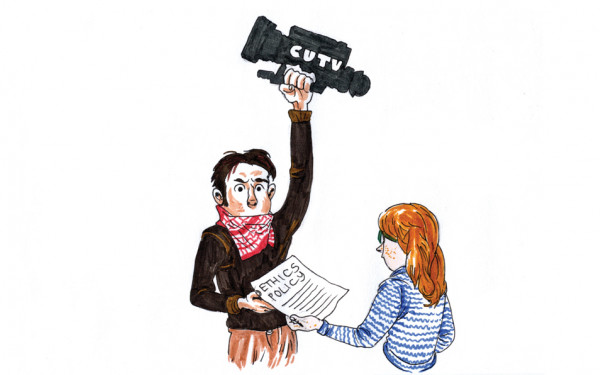CUTV Board Chair Resigns
Emily Campbell is Second Student Member to Step Down in a Week
Community University Television is down two board members.
Board Chair Emily Campbell and business student Baghdassar Balyan both resigned in the past week, cutting the student representation on the board in half.
Cori Marshall, one of the two remaining student board members, says a priority right now is “filling those positions as quickly as possible.”
The station’s bylaws require a majority of the board to be made up of students, but without Campbell and Balyan this requirement is not met.
Campbell outlined her reasons in a letter sent to The Link, saying she was exhausted by opposition to drafting an ethics policy and discussing potential airtime on Vidéotron’s forthcoming English community TV station.
“I’m flabbergasted at the community’s resistance to even set up a committee with which to talk about this cable opportunity,” writes Campbell in her letter.
An ethics policy has been drafted by Marshall, which he says is largely based on the Canadian Association of Journalists ethics guidelines.
Balyan’s objective on the station’s board was to increase the involvement of its membership, and general student awareness of the station. To do this he enlisted the help of the John Molson Marketing Association to create a plan for getting the word out.
The business students’ association stopped working with CUTV last month, however.
“They are not interested in rebranding from what I see,” said JMMA member Josh Swan, who met with CUTV staff members Chico Peres and Fahim Moussi to work on the marketing plan.
But according to Moussi and Peres, the JMMA wasn’t bringing them any new information.
“The focus isn’t on changing the label so people wouldn’t associate CUTV with militant action,” said Moussi. He says what’s more important is creating policy to guide how staff interacts with members.
The two are currently working on policy on use of the station’s equipment and space, as well as a document clearly outlining that the content creator retains copyright over their work.
CUTV gained international attention during the 2012 student strike for live-streaming nightly protests. But by the winter of 2012, most of the station’s board and staff had resigned in the turmoil of resuming day-to-day operation without the country’s largest student movement to document.
“I think there’s just too much drama happening,” said Brian Mann, the station’s new board chair following Campbell’s departure. “They’re always talking about the student strike, but right now there is no student strike.”
Mann is a community member on the station’s board, and worked at CUTV for four years before the station was run by Laith Marouf and Laura Kneale.
“I didn’t see this coming. It was completely out of the blue,” he said of Balyan and Campbell’s resignations, adding he didn’t see any signs of hostility between the JMMA and CUTV staff.
But, he added, “there are still residual effects of what happened last year.”
Mann says the station needs to continue improving their outreach to their membership. All Concordia undergraduates pay a fee levy of 34 cents per credit to the station, but for this to continue CUTV must win a referendum on the fee levy in this spring’s Concordia Student Union general elections.
Moussi is working on an online member portal for staff to keep better track of ongoing projects, and for members to have space to talk in a forum.
“Communication seems to be underlying every problem,” said Moussi.
For the moment, however, Balyan says the station isn’t doing enough to engage the students that have funded them for more than a decade.
“As a board member I am not going to spend my time with something that doesn’t want to be healed,” he said.

_900_598_90.jpg)


_1_600_375_90_s_c1.jpg)
_600_375_90_s_c1.jpg)
